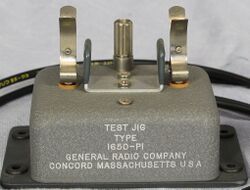1650-P1: Difference between revisions
Jump to navigation
Jump to search
No edit summary |
No edit summary |
||
| Line 15: | Line 15: | ||
The {{Title|General Radio 1650-P1 Test Jig}} was introduced in {{Catalog P}} and remained available through {{Catalog 1978}}. | The {{Title|General Radio 1650-P1 Test Jig}} was introduced in {{Catalog P}} and remained available through {{Catalog 1978}}. | ||
It is an accessory designed for the [[1650-A]] but useful with any instrument that accepts the Type [[274-NK]] double plug. | |||
the Type [[274-NK]] double plug. | The 1650-P1 provides a three-terminal connection to the measuring device – two shielded, ungrounded terminals to the unknown, and a ground terminal. | ||
The terminals of the test jig provide a rapid way to connect axial lead components for testing and sorting. | |||
==Specifications== | ==Specifications== | ||
Revision as of 23:03, 24 April 2024
The General Radio 1650-P1 Test Jig was introduced in Catalog P (1959) and remained available through Catalog 1978.
It is an accessory designed for the 1650-A but useful with any instrument that accepts the Type 274-NK double plug. The 1650-P1 provides a three-terminal connection to the measuring device – two shielded, ungrounded terminals to the unknown, and a ground terminal. The terminals of the test jig provide a rapid way to connect axial lead components for testing and sorting.
Specifications
- Lead Resistance: 0.08 Ω total
- Inductance Q Error: D (or 1/Q) of less than 0.007





